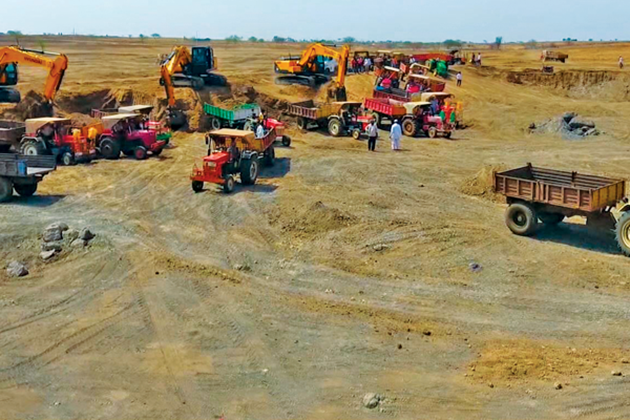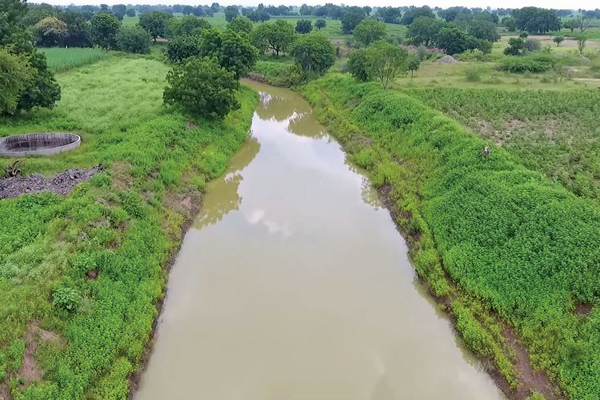
ICICI Bank aims to conduct its business responsibly with prudent use of resources. Even as the Bank expanded its network and people during fiscal 2020, adoption of sustainability principles and benchmarks at the new premises was ensured with steady gains in efficiency.The Bank follows responsible financing practices by promoting environment-friendly sectors and has laid emphasis on environmental and social risk management objectives as a part of financing. The focus on encouraging customers to transact digitally and creating a positive impact on the environment was deepened further through the launch of a series of digital products and services during the year. Further, the effort to create a net zero energy premises at a training centre of ICICI Foundation was a step towards examining future designs in sustainable infrastructure.
Sustainable financing
Responsible financing is an important focus for the Bank, governed by prudent risk management practices. The Bank has in place a social and environmental management framework that integrates analysis of the environmental and social risk assessment into the overall credit appraisal process. The framework is applicable for all new financing proposals above a specific threshold. The key elements of the assessment include an exclusion list, seeking a declaration from borrowers of compliance with applicable national environmental guidelines and approvals for qualifying proposals subject to threshold criteria defined in the framework, and due diligence by a Lender’s Independent Engineer (LIE) for large-ticket project loans identified as per the criteria defined in the framework.
The Bank’s lending to environment-friendly sectors are based on appropriate assessment of risks and returns. The Bank has actively financed projects for capacity creation in environment-friendly sectors. This includes renewable energy sectors like solar, wind and hydro power and other sustainable sectors like waste processing and mass rapid transport. The Bank’s outstanding portfolio to the renewable energy sectors stood at about `29.00 billion at March 31, 2020. The Bank had availed lines of credit from select multilateral agencies towards financing green or sustainable assets. The assets financed under these lines include financing for wind, solar, biomass plants and energy efficiency projects. At March 31, 2020, the outstanding lending by the Bank for such specific purposes was USD 96.9 million.
An internal team within the Bank is dedicated to providing financial assistance to initiatives that promote biodiversity, environmental sustainability and initiatives in education, health, sanitation and livelihoods. The team’s mandate is to administer funding lines received from bilateral, multilateral agencies and Government of India, specifically for such projects. Their efforts include identifying relevant projects, ensuring financial assistance through collaboration or directly and knowledge sharing. During fiscal 2020, some of the initiatives supported by the group include:
- A project to rejuvenate water bodies and rivulets by recharging ground water aquifers at three locations in Uttarakhand and at one location in Uttar Pradesh. The initiative has been implemented in collaboration with local communities. The efforts at these locations include trenching, construction of check dams and improving the green cover by planting indigenous, ecologically beneficial tree species.
- Providing assistance to implement watershed development; i.e. rejuvenation of defunct water structures and construction of new structures in four villages of Bhoom taluka of Osmanabad District in Maharashtra, which is an arid region. This is expected to result in soil conservation, controlling run-off, increase in water table and water storage capacity helping in growing crops during both, kharif and rabi seasons. This initiative covers an area of 2,500 hectares and is expected to positively impact 1,300 families in four villages.
- Promoting women entrepreneurship by supporting Self-Help Groups in Uttarakhand and Jammu & Kashmir to process local produce of fruits, millets and herbs which also ensures livelihood generating opportunities for the local community.
- Supporting activities like construction of classrooms for differently-abled children, setting up hostel facilities for orphaned students, skill development for differently-abled children and enabling free surgeries and transplants of the underprivileged. The group has also supported a mangrove plantation initiative along the barren coastal land in Ratnagiri.
For more details on further such initiatives, please refer to the ICICI Bank ESG Report 2019-20


Environment Sensitivity in the Bank’s Operations
Our journey focussed on energy conservation and environment protection was further strengthened in fiscal 2020. It was a challenging year as the Bank significantly expanded its branch network and also its staff strength. However, the endeavour to maintain efficiency in operations continued to be a key focus area.
Green Building Features
Since fiscal 2018, the Bank has been ensuring Indian Green Building Council (IGBC) green building features in all its new offices and branches at the time of set up. During fiscal 2020, the Bank added about 1.45 million square feet of workspace. All new offices and branches were designed and commissioned keeping in view the green building features as specified by IGBC. Two new premises were awarded the 'Platinum' rating by IGBC in fiscal 2020. With this, the total number of premises awarded the highest rating increased to 11 at March 31, 2020 covering a total area of 2.28 million square feet. As on March 31, 2020, 130 of our employees were IGBC Accredited Professionals. This large number of accredited professionals is a reflection of the Bank’s commitment to building internal capability to ensure consistency and sustainability of our efforts.
Net Zero Energy building
ICICI’s Rural Self Employment Training Institute (ICICI RSETI) in Jodhpur, which provides pro bono vocational training to less privileged youth, moved to a new facility which was ‘Net Zero Energy - Platinum’ rated by the Indian Green Building Council (IGBC). Key features that enhance the sustainability of the building include less water consumption, energy optimisation, conservation of natural resources, less waste generation and provision of healthier spaces for its occupants. Consumption of water and electricity is lower by 50% compared to conventional buildings.
For more details on further such initiatives, please refer to the ICICI Bank ESG Report 2019-20

Efficient Energy Management
The Bank promotes use of renewable energy sources wherever feasible. During fiscal 2020, 1.7 MWp of renewable energy capacity was added, taking the total onsite capacity to 2.8 MWp at March 31, 2020. The Bank also added 1.0 MWp of on-site solar capacity at the Disaster Recovery Centre. The total utilisation of renewable energy in the Bank’s energy consumption increased by 3.2% during fiscal 2020 and accounted for 7.4% of total energy consumption during the year. The full impact of the new renewable energy facilities is expected to be realised in the next year.
Under the open access mechanism for power sourcing, the Bank has signed power purchase agreements (PPA) for solar and wind energy purchase for three of its large offices. The total contracted capacity is 9 MWp. These offices have been using renewable energy since fiscal 2016 and 50% of the energy requirement at these offices are met through renewable energy.
While electricity consumption in absolute terms increased during fiscal 2020, driven by the expansion in the physical network and staff strength, the consumption was lower on a per unit basis due to efficiency measures adopted. Per capita consumption of electricity declined by 11% while energy use per square feet was lower by 2% on a year-on-year basis. Some important energy efficiency measures deployed included:
- Indirect/Direct adiabatic cooling system at the Bank’s data recovery centre was commissioned which has led to improvement in the Power Utilisation Effectiveness, an indicator of data centre infrastructure efficiency, by 20%
- Detailed energy audit of the ICICI BKC Service Centre (Corporate Office) in Mumbai and the large office at Hyderabad, and measures adopted subsequently have led to savings in electricity consumption
- UPS capacity optimisation at large offices to reduce the capacity by at least 40%. New-age Integrated Gate Bipolar Transistor (IGBT) based Modular UPS with efficiency of more than 95% were deployed at sites
- Lithium Ion battery storage system deployed at two branches which would enhance reliability and improve energy efficiency at branches
- At 492 branches and 200 ATMs, old and inefficient airconditioning systems were replaced delivering more than 25% savings in energy
Water Savings
Water consumption per day in the 16 large offices of the Bank was 25% lower than the benchmark of 45 litres per person per day as per the Bureau of Indian Standards for large offices. The Bank has undertaken various initiatives to conserve water. The Bank recycles and reuses waste water at three large offices including the ICICI Service Centre (Corporate Office) at Bandra Kurla Complex, Mumbai. All new offices and branches opened during the year were fitted with water-efficient plumbing fixtures. Rain water harvesting is being undertaken at three large offices.
Paper Consumption
Expanding the digital advantages to customers and in the Bank's processes were an ongoing effort through fiscal 2020. The Bank believes that encouraging customers to adopt digital practices not only helps in improving efficiency and reducing servicing time, but also creates a positive impact on the environment. During the year, a range of insta-lending products were offered to customers which are digitally processed end-to-end. There were significant efforts towards simplifying processes and reducing physical movement of documents. A significant portion of the Bank’s operations today are paperless. The Bank procures environment-friendly copier paper which is manufactured from wheat straw, which is an agricultural residue. The Bank is reviewing its systems and process for tracking and optimising paper consumption.
Waste Management
The Bank focusses on waste reduction and its management in every aspect of its operations. The Bank undertakes recycling of organic waste using composting technique at the Bank’s large offices in Mumbai at Bandra-Kurla Complex and Chandivli, and at the Learning Centre in Khandala.
E-waste is disposed by handing over to certified recyclers. The Bank also supports reuse of electronic devices. The Bank uses remanufactured toners in printers which gets recycled at least two times. The Bank also recycles its IT assets which are then donated. In fiscal 2020, 35 assets were donated.
Certifications
The Bank has adopted corporate objectives for environment conservation activities in conformity with the ISO 14001 standard 'International Organisation for Standardisation’ for environmental management systems. This enables the Bank in developing policies for addressing the objectives of environmental sustainability and assessment of impact of the Bank’s activities, products and services on the environment.
The environment management systems at ICICI Service Centre at BKC, Mumbai are ISO 14001 certified.
For more details on further such initiatives, please refer to the ICICI Bank ESG Report 2019-20
As a recognition of the Bank's contribution towards maintaining ecological balance, ICICI Service Centre in Bandra-Kurla Complex, its registered office in Vadodara, its state-of-the-art data centre as well as one of its branches in Hyderabad have been awarded a 'Platinum' rating by IGBC. The building was the country’s first data centre to be awarded ‘Platinum’ by IGBC. The call centre at Thane in Mumbai was declared as a leader in energy efficiency at the National Level Energy Conservation & Management Awards by the Confederation of Indian Industry (CII).